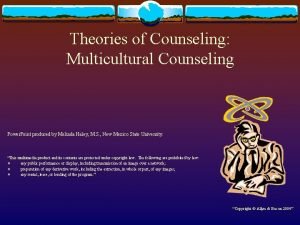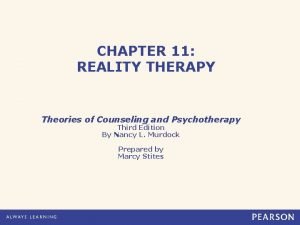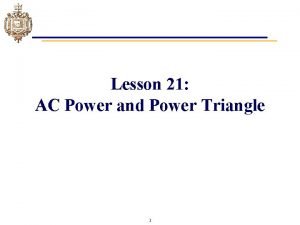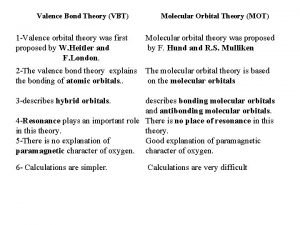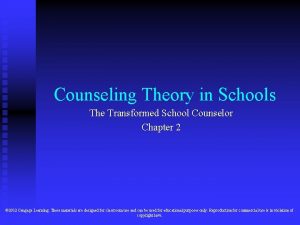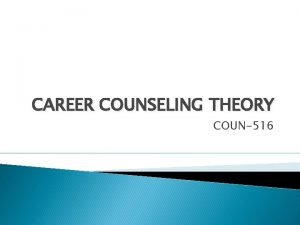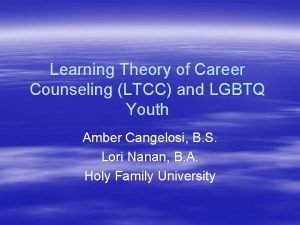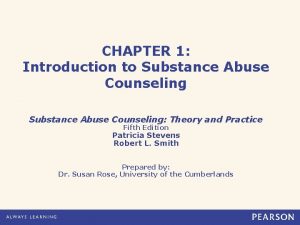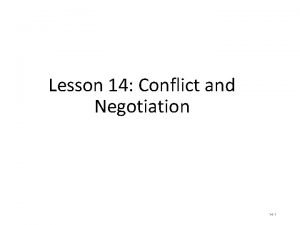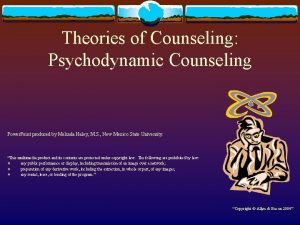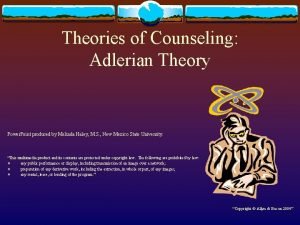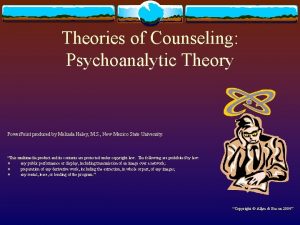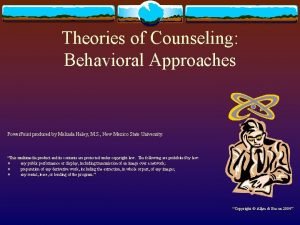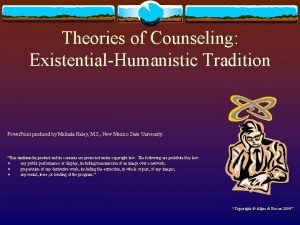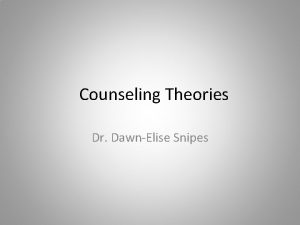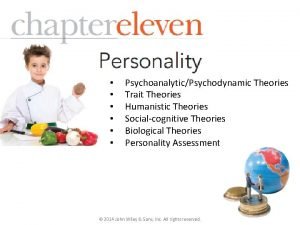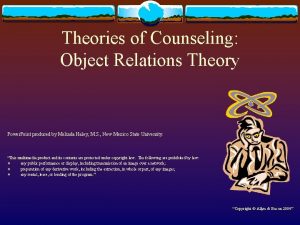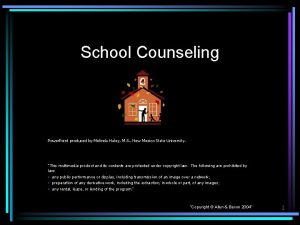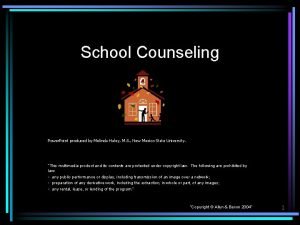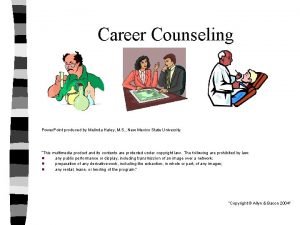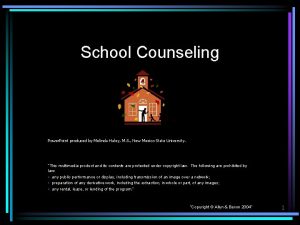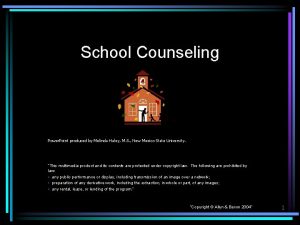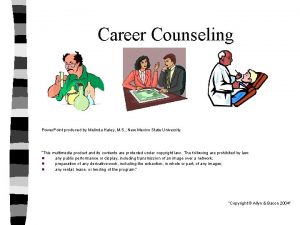Theories of Counseling Integrative Theory Power Point produced

















- Slides: 17

Theories of Counseling: Integrative Theory Power. Point produced by Melinda Haley, M. S. , New Mexico State University. “This multimedia product and its contents are protected under copyright law. The following are prohibited by law: v any public performance or display, including transmission of an image over a network; v preparation of any derivative work, including the extraction, in whole or part, of any images; v any rental, lease, or lending of the program. ” “Copyright © Allyn & Bacon 2004”

Integrative Theory Putting It All Together v Many clinicians use three or four different theories in their practice. v Some look to common elements within all theories. v Some ascribe to technical eclecticism or integrate several theories into one. v Some believe in specific treatments for specific issues or symptoms. “Copyright © Allyn & Bacon 2004”

Integrative Theory Are Some Theories Better Than Others? v Research seems to show that there is little therapeutic difference between theories and each are about equally effective. This may be due to: Ø The fact that the different approaches are more similar than what we think. Ø Regardless of theory, most practitioners do similar things. Ø There are many different ways to achieve wellness. Ø Research measurements are not picking up the subtle differences between theories. “Copyright © Allyn & Bacon 2004”

Integrative Theory Integrating Theories v It is important to know how theories are different and how they are the same. v One method of integration is to read everything you can on theories you like best. v Another is applying them and learning through trial and error which theories work best. v A third way is to group theories together by their significant features. “Copyright © Allyn & Bacon 2004”

Integrative Theory Integrating Theories How do theories differ in relation to: Philosophy Techniques Theory Treatment Goals “Copyright © Allyn & Bacon 2004”

Integrative Theory Integrating Theories Specifics to look for: Action vs. Insight Cognitive vs. Affective T H E O R Y Present vs. Past Rigid vs. Flexible Roles “Copyright © Allyn & Bacon 2004”

Integrative Theory Integrating Theories Another way to sort theories is by counselor’s role and presence: Ways of Being Ways of Intervening Ways of Knowing “Copyright © Allyn & Bacon 2004”

Integrative Theory Why Integrate Theories? v Because one theory does not fit all people or all situations. v Manualizaiton of Therapy: Development of specific , empirically tested and standardized treatments for a specific diagnosis. v It enables a counselor to see each client as unique and apply theories that fit that client in regard to culture, presenting issue, and diversity. “Copyright © Allyn & Bacon 2004”

Integrative Theory What Research Says: Common Factors in Therapy v Hope and Expectations: Clients have expectations that shape therapy. v Relationship: The therapeutic relationship is one of the most important elements of therapy. v Therapeutic Techniques: All therapy effects some sort of change on the client. v Outside Factors: Client variables also play a big role. “Copyright © Allyn & Bacon 2004”

Integrative Theory What Clients Think Is Important In Therapy v Having a private place to talk with someone to listen. v The therapist’s personality, especially when therapist is kind, caring, and supportive. v Being understood. “Copyright © Allyn & Bacon 2004”

Integrative Theory in Practice v The therapist is intentional in what he or she does. It is not a random process. v Counseling strategies are changed or adjusted to fit the client’s needs, worldview, or issues. v The therapist specifically considers cultural implications regarding methods chosen. “Copyright © Allyn & Bacon 2004”

Integrative Theory in Practice v One basic tenet is that clients have many of their own answers and are found within the language of the client. v The therapist looks at what the client says for clues to helping the client. v One goal of integrative therapy is to help the client find out what they really want and then help him or her achieve it. “Copyright © Allyn & Bacon 2004”

Integrative Theory BASIC ID A method that looks at major areas of human functioning: B = Behavior A = Affect S = Sensations I = Images C = Cognitions I = Interpersonal Relationships D = Drugs, biological functions, nutrition and exercise “Copyright © Allyn & Bacon 2004”

Integrative Theory Questions to Ask Yourself About Constructing Your Own Theory v What is your worldview? v How do you define ethical practice? v How do you define empathy? v What microskills are you skillful at and which do you need to work on? “Copyright © Allyn & Bacon 2004”

Integrative Theory Questions to Ask Yourself About Constructing Your Own Theory v How do you make sense of the focusing concept? v What do you believe about research and continuing education? v What do you believe about multiculturalism? v How do you feel about spirituality? “Copyright © Allyn & Bacon 2004”

Integrative Theory Questions to Ask Yourself About Constructing Your Own Theory v What theories do you like? How might you integrate these? v How has your developmental, familial or cultural history shaped who you are? “Copyright © Allyn & Bacon 2004”

Resources Ivey, A. E. , D’Andrea, M. , Ivey, M. B. and Morgan, L. S. (2002). Theories of counseling and psychotherapy: A multicultural perspective, 5 th ed. Boston, MA. : Allyn & Bacon. James, R. K. & Gilliland, B. E. (2003). Theories and strategies in counseling and psychotherapy, 5 th ed. Boston, MA: Allyn & Bacon. Kottler, J. A. (2002). Theories in counseling and therapy: An experiential approach. Boston, MA: Allyn & Bacon. “Copyright © Allyn & Bacon 2004”
 Theories of multicultural counseling
Theories of multicultural counseling 11 theories of counseling
11 theories of counseling According to integrative social contracts theory
According to integrative social contracts theory Unconcerned or nonissue approach
Unconcerned or nonissue approach The real lesson 21
The real lesson 21 Power bi training powerpoint
Power bi training powerpoint Point point power
Point point power Vbt vs mot theory
Vbt vs mot theory School counseling theory
School counseling theory Parsons 1909
Parsons 1909 Ltcc counseling
Ltcc counseling Substance abuse counseling theory and practice
Substance abuse counseling theory and practice How to expand the pie in negotiation
How to expand the pie in negotiation Functional medicine near santa rosa
Functional medicine near santa rosa Integrative vs distributive negotiation
Integrative vs distributive negotiation Conflict process
Conflict process One's negotiation objective should be:
One's negotiation objective should be: Distributive vs integrative negotiation
Distributive vs integrative negotiation
